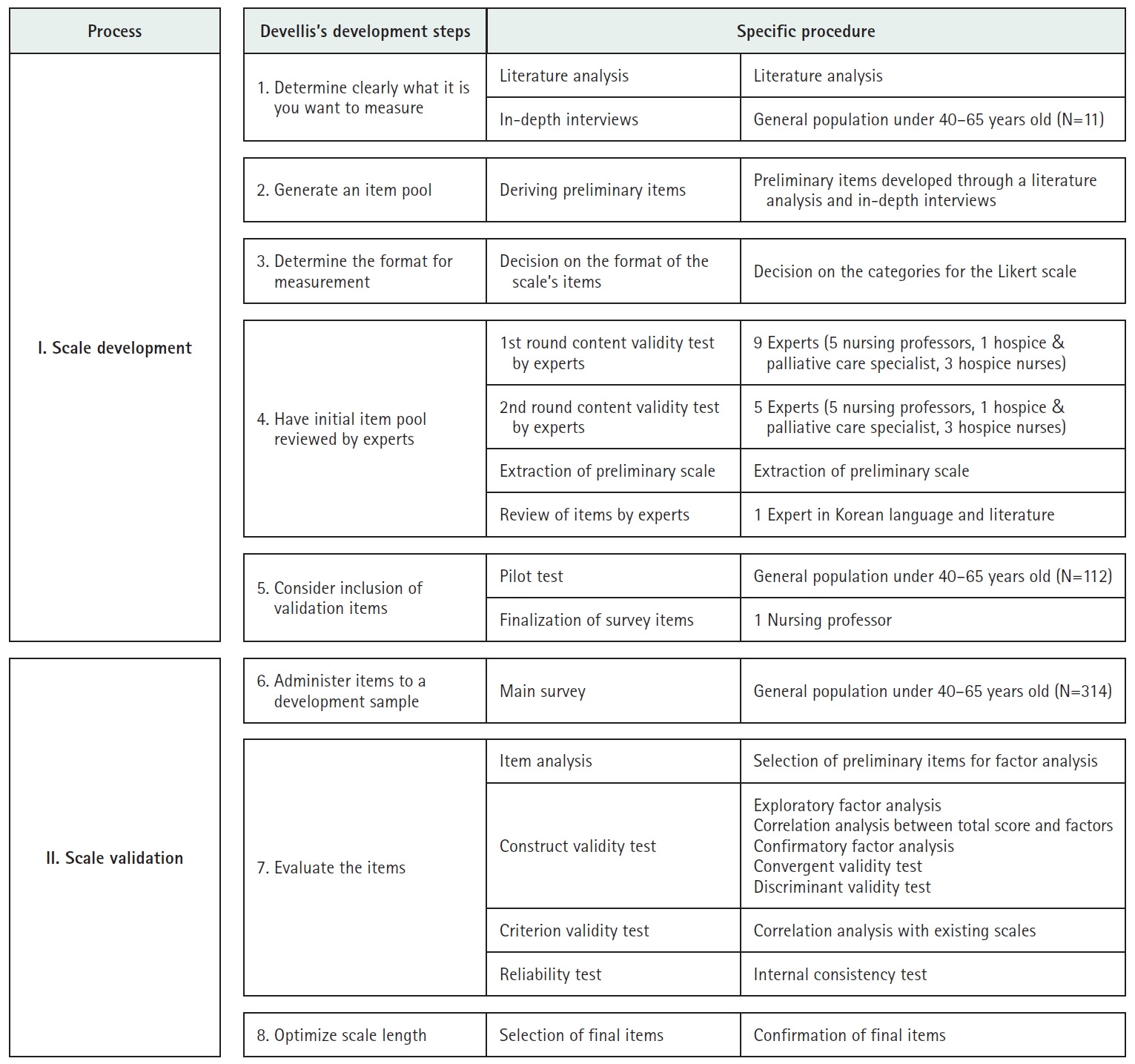-
Development of a well-dying awareness scale for middle-aged adults in Korea: a mixed-methods study
-
Yu Jin Jung, Eun Joung Choi
-
J Korean Acad Nurs 2025;55(2):285-300. Published online March 28, 2025
-
DOI: https://doi.org/10.4040/jkan.24121
-
-
 Abstract Abstract
 PDF PDF ePub ePub
- Purpose
This study aimed to develop a valid and reliable tool to measure awareness of well-dying among middle-aged adults.
Methods
A mixed-methods approach was adopted, consisting of a qualitative phase to identify the characteristics of well-dying and a quantitative phase to validate the instrument with middle-aged participants. Initially, 76 items were generated through a literature review and in-depth interviews, and these were reduced to 35 items through expert validation. A pilot survey was conducted with 112 individuals aged 40–65, selected via quota sampling from 17 administrative regions in South Korea. Based on the pilot survey results, the instrument was refined to 32 items for the main survey. The main survey included 314 participants recruited through quota sampling in Busan and Ulsan Metropolitan Cities and Gyeongsang Region. Exploratory factor analysis (EFA), confirmatory factor analysis (CFA), and reliability testing were performed to validate the instrument.
Results
The final scale comprised 23 items across six factors. EFA demonstrated an explanatory power of 69.1%, with factor loadings ranging from 0.53 to 0.88. CFA confirmed the instrument’s validity, and reliability was established with a Cronbach’s α of .93.
Conclusion
This instrument is a validated and reliable tool for measuring middle-aged individuals’ awareness of well-dying. It can serve as an effective resource for evaluating and assessing well-dying awareness in the middle-aged population.
-
Hermeneutic Phenomenological Study on the Experiences of Employment of Married North Korean Women Defectors Rearing Children
-
Hyun Mee Cho, Eun Joung Choi
-
J Korean Acad Nurs 2020;50(1):39-51. Published online January 31, 2020
-
DOI: https://doi.org/10.4040/jkan.2020.50.1.39
-
-
 Abstract Abstract
 PDF PDF
- Abstract
Purpose:
This study aimed to understand the experiences of married North Korean women’s child-rearing, working lives, and their home and work environment in depth.
Methods:
This study adopted van Manen’s hermeneutic phenomenological method to qualitatively analyze data. The participants were 8 married North Korean women defectors. Data were collected through in-depth interviews and observations from July 4 to August 20, 2018.
Results:
Nine essential themes emerged: more personal challenges after overcoming a life-threatening crisis; hopes of firmly settling in this land; the wound from the north, which chased them here; a body that becomes stronger through hardship; being stuck in a past full of anxiety and pain; the present is full of hope; hope for the future; sense of alienation from coworkers that cannot be overcome; and sense of power to endure an exhausting work life.
Conclusion
This study provided a broader understanding of the life and experiences of married women from North Korea. It highlights the need for nurses to recognize their importance in nursing care. The study also suggests that academic and practical approaches for nursing, and basic data for a nursing intervention for married women from North Korea be provided. The study findings can be used as a basis for preparing a national policy that will help North Korean defectors to find employment and gain stability.
|






